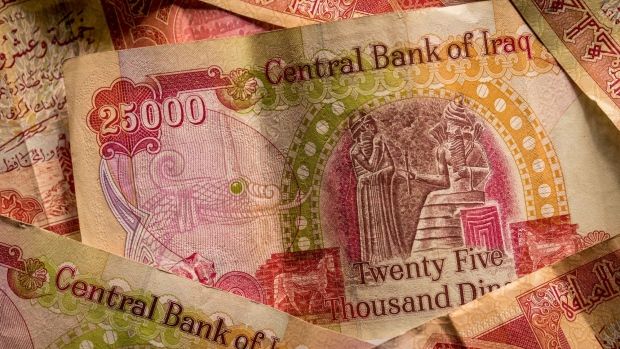Feb 7, 2023
Iraq Revalues Currency Weeks After Replacing Central Bank’s Head
, Bloomberg News

(Bloomberg) -- Iraq revalued its currency just over two weeks after replacing the central bank governor as part of an effort to stabilize the foreign exchange market.
The cabinet on Tuesday approved a decision to set the exchange rate at 1,300 dinars per US dollar, according to a tweet on Prime Minister Mohammed Shia Al-Sudani’s office account. No further details were provided.
The Iraq News Agency said the new rate will go into effect from Wednesday. The dinar’s official value was previously set at 1,460 but traded weaker in the parallel market.
The central bank will continue its measures until the new exchange rate is stable and said it’s seeking to achieve its target in steadying the general level of prices to protect the buying power of the citizens, according to the Iraq News Agency.
OPEC’s second-biggest producer has come under pressure from the US to limit the flow of money into neighboring Iran, with the New York Federal Reserve last November imposing tighter controls on dollar transactions by Iraqi commercial banks.
The measures contributed to dollar shortages in Iraq, stoked a slide in the dinar and fanned inflation, prompting the prime minister to replace central bank Governor Mustafa Ghalib Mukheef.
What Bloomberg Economics Says...
“Iraq is facing dollar scarcity, which is causing the dinar to weaken in the black market. Revaluation won’t solve the problem — it doesn’t change the supply of dollars going into the market. Instead, it raises Iraq’s dependency on oil, especially when combined with higher government spending.”
—Ziad Daoud, chief emerging markets economist.
Iraq’s foreign minister along with the central bank’s acting governor, Ali Al-Allaq, and advisers are due to visit Washington to discuss issues including the newly applied standards for US dollar transfers, Al-Sudani said last month in an interview with the state-run Iraqiya channel.
The US dollar exchange rate fluctuation versus the Iraqi dinar will be discussed during the visit, the premier said.
The economy of Iraq is entirely dependent on oil exports, and plagued by political instability, corruption and dilapidated infrastructure.
--With assistance from Khalid Al-Ansary.
©2023 Bloomberg L.P.







